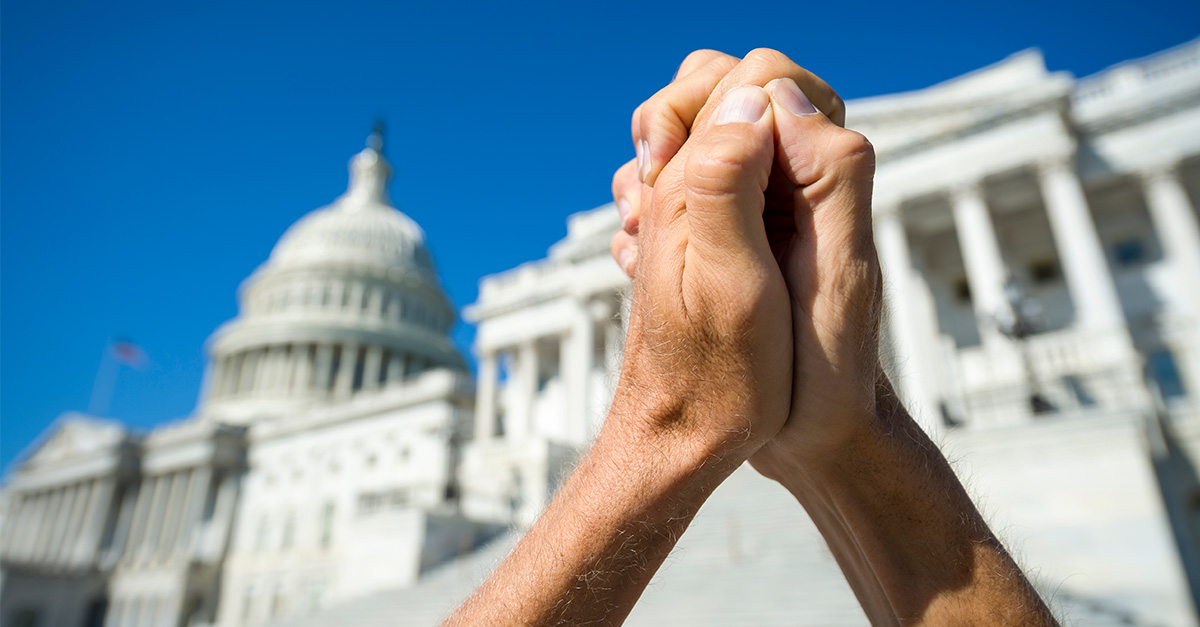


Get a free copy of Parental Rights & Education when you subscribe to our newsletter!

“Remember: Politics is not your “god,” God is your God. And remember that politics makes an awful false god for others, even your political opponents. So, while we work against those with whom we disagree politically, we must still pray for them.”
–WILLIAM WOLFE
As America has become increasingly less religious in general, and less Christian in particular, people have sought other organizing principles around which to build their lives. The truth is that everybody worships something. The only question is, What do you worship?
Of course, I strongly believe that Christians should be some of the most active individuals in politics, but we always approach the issue, and our efforts, under the guiding and ordering principle of the First Commandment: “You shall have no other gods before me” (Exodus 20:1).
Our secular neighbors have no such metaphysical ceiling. And this is why, in part, politics has become so intense and hostile in the modern era. Politics has become a religion for so many, raising the stakes to existential levels.
Even more, when we consider the incredibly sharp lines that divide the two major parties and political philosophies in America, we realize these are no small disagreements. Is the unborn child in the womb a human being or not? Is marriage between a man and a woman, or is it just whatever the Supreme Court declares it to be? Should children have their healthy sexual organs amputated in “gender-affirming” surgeries, or is that child abuse of the most horrific kind? There really is no “middle ground” on such matters.
I raise all of this as important context to the question at hand and to buttress a singular statement: Given that we are in what can appear to be a life-or-death battle (and it is for the preborn), it can be very hard for Christians to pray for their political opponents. Yet we are still commanded to do so! In Matthew 5:43-45, Jesus instructs His followers,
“You have heard that it was said, ‘Love your neighbor and hate your enemy.’ But I tell you, love your enemies and pray for those who persecute you, that you may be children of your Father in heaven.”
So how can Christians pray for their political opponents? Here are three ways:
First and foremost, we should pray that our political opponents who don’t know Jesus Christ will come to a saving knowledge through repentance and faith. This is exactly what Jesus Himself prioritizes as He begins His earthly ministry in Mark 1:15, proclaiming,
“The time is fulfilled, and the kingdom of God is at hand; repent and believe in the gospel.”
Yes, we hope to change minds and hearts on political issues and policy disputes, but we also long for those who are still trapped in their sins to find full forgiveness, spiritual regeneration, and eternal life through Jesus Christ. In all of our political endeavors, we should strive to be men and women who have “the beautiful feet” of those who bear the Gospel message to the lost, like Paul exhorts us in Romans 10:13-16:
“For ‘everyone who calls on the name of the Lord will be saved.’ How then will they call on him in whom they have not believed? And how are they to believe in him of whom they have never heard? And how are they to hear without someone preaching? And how are they to preach unless they are sent? As it is written, ‘How beautiful are the feet of those who preach the good news!’”
We should both pray for our political opponents and act to share the good news of the Gospel with them as we have the opportunity. It’s a good thing to desire that progressives become conservatives. It’s an even better thing to desire — and pray — that unbelievers become Christians and are delivered from the “domain of darkness and transferred…to the kingdom of his beloved Son, in whom we have redemption, the forgiveness of sins” (Colossians 1:13-14).
Second, we should pray for the peace and general safety of our political opponents. Just as we pray for their spiritual deliverance, we should pray for their temporal and physical well-being. In fact, in 2 Timothy 2:1-4, Paul connects the preservation of a quiet and peaceful life to the spread of the Gospel message and the spiritual salvation that we long to see sweep the land. He writes:
“I urge, then, first of all, that petitions, prayers, intercession and thanksgiving be made for all people—for kings and all those in authority, that we may live peaceful and quiet lives in all godliness and holiness. This is good, and pleases God our Savior, who wants all people to be saved and to come to a knowledge of the truth.”
Here Paul makes a few very important points. First, in praying for the peace of our political opponents, that will also include rulers — politicians, Presidents — that we don’t like and didn’t vote for. We are commanded to pray for “kings and all those in authority,” and he doesn’t give anyone a loophole for not liking the authority. It’s a good and right thing to pray for your state, local, and elected officials.
But also see that in this command that Paul wants Christians to pray for the general peace of all people so that they can have opportunities to hear the Gospel and “come to a knowledge of the truth.” There is no contradiction between desiring and praying for good rulers, peace for all people, including our political opponents, and spreading the Gospel.
Consider this, too: The other side of positively praying for your political opponent’s peace is refusing to celebrate their misfortune. This can be particularly difficult sometimes — we all have that instinct to rejoice when our enemies stumble. But heed this warning from Proverbs 24:17-18:
“Do not gloat when your enemy falls; when they stumble, do not let your heart rejoice, or the LORD will see and disapprove and turn his wrath away from them.”
Third, and finally, it is right and good to pray that political opponents fail when they pursue evil policies. In the Bible, there are clear and strong examples of times when the people of God prayed that their enemies would be defeated — and it was just and good for them to do so. In fact, there is a specific type of Psalm that deals with the desire for deliverance from, and judgment for, evil men and their schemes — it’s called an “imprecatory” psalm. Imprecatory comes from the Latin word “imprecate,” which means to “utter a curse at someone.”
Hold on just a moment — this is not a blank check to curse out your political opponents! No, when we see these types of Psalms or other moments of God’s people calling on God to stop evil men, it is always in light of glaring injustice and evil committed against man and God.
However, there can be no denying that in America there are some present and ongoing injustices that would merit such prayers for judgment, such as abortion, the transgender attacks on children, and the perversion of our youth by radical activists.
Look at how David prays in Psalm 3:7 for an example of this:
“Arise, LORD! Deliver me, my God! Strike all my enemies on the jaw; break the teeth of the wicked.”
When we pray for the plans of those who push abortion to fail, that honors God and loves our preborn neighbors. When we pray for the closure of every single “transgender clinic” in the United States, that honors God and loves those made in His image.
We can pray, like David in Psalm 54:4-5,
“Behold, God is my helper; the Lord is the upholder of my life. He will return the evil to my enemies; in your faithfulness put an end to them.”
Just because we love our enemies, and pray for them, does not mean we should be ambivalent about their success in promoting evil. No, rather, we love them best by working against their evil policies, like abortion and transgenderism. We love them and those they would hurt with their political positions. Prayer is never pitted against action, rather it is the prelude to action. Pray for their evil plans to be foiled by God, and then go do the work needed to turn that prayer request into reality.
Remember: Politics is not your “god,” God is your God. And remember that politics makes an awful false god for others, even your political opponents. So, while we work against those with whom we disagree politically, we must still pray for them.
So, when you’re concerned about the current turmoil in our country and you don’t know what to pray, pray these three things: Pray for the salvation of our leaders and political opponents, pray for their peace, and pray that their evil plans and policies would be foiled. Far from being unloving, this is the best way we can love others in the political arena — especially those on the other side of the aisle.
Follow William on Twitter! @William_E_Wolfe
Ready to dive deeper into the intersection of faith and policy? Head over to our Theology of Politics series page where we’ve published several long-form pieces that will help Christians navigate where their faith should direct them on political issues.

Notifications